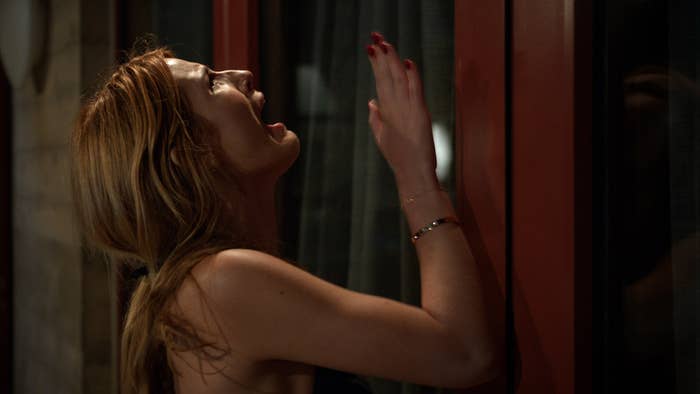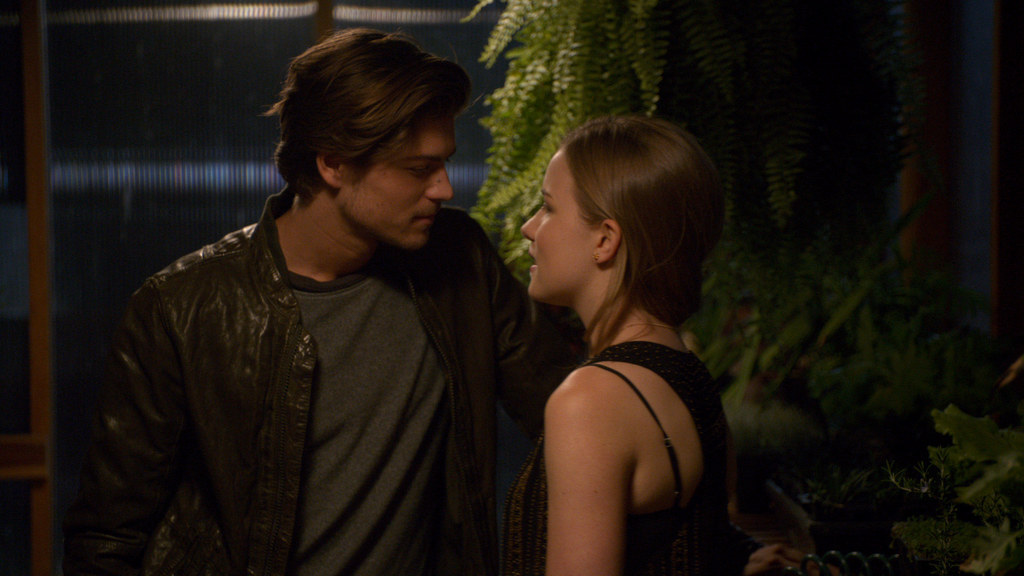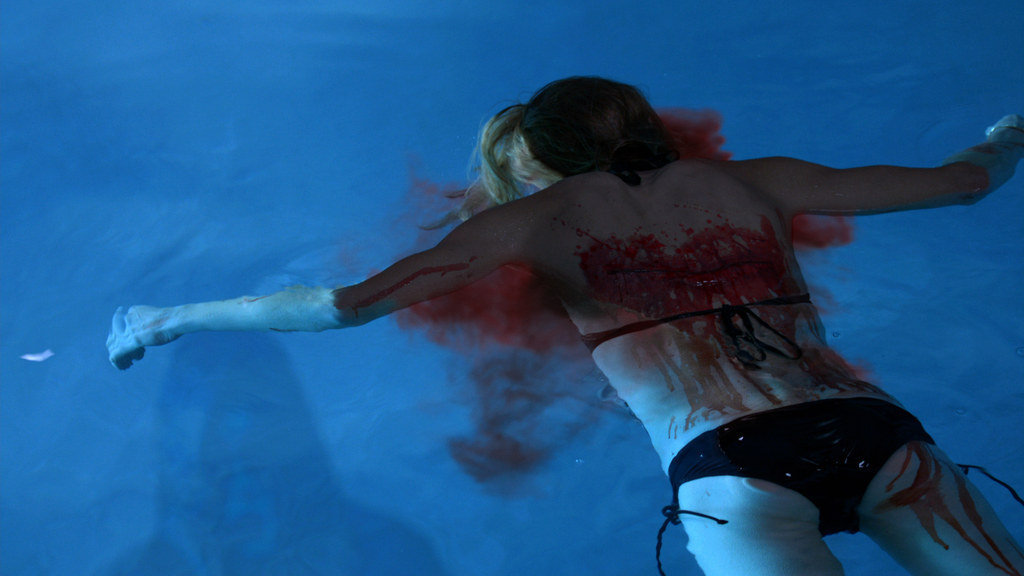
When it was announced in October 2014 that the genre-redefining horror franchise Scream was getting turned into a weekly series on MTV, many were skeptical — especially once it was revealed the show wouldn't take place in Woodsboro, wouldn't revolve around Sidney Prescott (played by Neve Campbell in the film franchise), and wouldn't feature the Ghostface killer.
MTV's Scream is set in the fictional Lakewood, an average suburb rocked by the brutal murder of Nina Patterson (Bella Thorne) and the revelation that it may be connected to another murder that happened 20 years prior. Emma Duvall (Willa Fitzgerald), seemingly serving as the series' Final Girl, is a high school student who quickly begins to realize her mother (Tracy Middendorf) isn't the only one in her life hiding a dark, potentially deadly secret.
The first trailer may have converted some skeptics, but horror fans are a very discerning bunch. There are still questions upon questions.
So BuzzFeed News spoke with the show's executive producers, Jill E. Blotevogel and Jaime Paglia, to find out exactly what audiences can expect when MTV's Scream premieres on June 30.
On the show, Noah Foster (John Karna) says, "You can't do a slasher movie as a TV series." Let's start right there. Can you?
Jill Blotevogel: You absolutely can. That statement for me was essentially saying to everybody who was going to question and doubt and have issues with it, I wanted to let them know I was absolutely aware of the [challenge] of doing something like this, and yet we were still going to find a way to do it and entertain the heck out of them. Essentially, it's just a wink to the audience who love horror movies and realize they exist in 90 minutes and yet we're going to take it in a different way. I also worked on a show called Harper's Island, which attempted a similar sort of thing. It was more of a classic Agatha Christie, Ten Little Indians kind of thing. It's definitely possible.
Jaime Paglia: It's really, really hard. When I came on to do this with Jill, that line in particular was the reason I thought it might be possible, because we are acknowledging the challenges right out of the gate. It's the self-referential humor; the wink and nod to the audience to say, "Hey, listen, come along for the ride. We think we'll make it worth your while." And that's what we're doing.
JB: And of course the bookend to that is Noah's line later in the episode, when he sort of counters and says, "Well, maybe you can do it if you fall in love with the characters, if you understand the Friday Night Lights of it, and then realize that, yes, there's a horror movie going on here as well."
Right. He says in order to make these deaths matter, you have to care about the characters. So are you basically writing a dramatic TV series where people are being murdered?
JB: Yes.
JP: I think that's definitely accurate. What we try to do in every moment is separate out the fact that this is a town where people are being stalked and look at them individually as characters, figure out what their secrets and lies are, and what their relationship dynamics are going to be. So if you were to watch this as a regular teen soap, you would be engaged with them and care about them and the stakes would be there. We do end up having Friday Night Lights with life-and-death stakes.
JB: And it's also creating more of a mystery around the murders than ever existed in the Scream movies. It's kind of like the way Twin Peaks used the death of Laura Palmer to set off this chain reaction of looking deep into the underbelly of that small town. We're kind of using that format more than the Scream movies ever did. They always went fast and furious with a body count, whereas ours is going to take its time a little more and dig into the mystery a little more.

There's obvious advantages to having a recognizable brand as the title of your show. But if your show isn't set in Woodsboro and doesn't feature a killer in a Ghostface mask, why call it Scream? Do you feel like the title could actually work against you?
JB: We're building in some Easter eggs to the Scream franchise, but when I was first working on this and talking to [producer] Bob Weinstein about it, he was pretty clear that he wanted this to be a different world. He didn't want this to be Sidney and Dewey [David Arquette] and Gale [Courteney Cox]. He wanted the connective tissue to be the spirit of Scream. We will have a masked killer, and that is our biggest connection. But really, because we're doing this for MTV, it was creating a whole new world for Scream and a whole new cast of characters that would feel fresh.
JP: Also, the landscape of television is so different now than 1996 when the first movie came out. The killers in the first movie were, in some ways, not very methodical and planned. They were jumping out of the closet and frequently missing targets and getting kicked down stairs and there was more humor to it. We knew that, for a show to have any kind of sustainability, we needed a killer who was going to be smart and methodical and wouldn't have the kind of attacks that didn't actually lead to someone's serious peril or death because you lose the stakes if you're coming back week after week to an inept killer. You have to have a killer that, in some ways, can compete with Hannibal and Dexter and these other much more interesting, complicated, messed-up sociopaths so there is a plan, there is a long game versus just a couple nights of slaughter. You do need the time to spend with the characters where it isn't someone dying every moment, because otherwise you just turn into a show where there's a town-wide curfew lockdown and the FBI is brought in to put everyone in protective custody. Then there's no chance for any kind of romantic drama or personal stories.
Speaking of the deaths, the first episode features a severed head, a slit throat, a heart in a box, and a hanging. How graphic you can be?
JB: Because Scream is such an important franchise to so many people we're working with, there have been many strong opinions about how many people we should kill, how graphic the kills should be, and as you can see from MTV's latest promo, they're not afraid of blood. We're constantly taking in new opinions and making course corrections as we move forward in the season. We're trying to find a lot of ways to create shock and awe, but not always necessarily with the level of gore or the level of violence, but with — hopefully — the surprising nature of who we take out or how we take them out. It's tricky, because we have this amazing cast of talented actors, and the more you love them, the more you're like, "I don't want to kill them." It's a very interesting daily negotiation in figuring out who to kill, when to kill. It's an element that most shows don't have to deal with.
How have you navigated finding the balance of telling stories with these characters that have nothing to do with the horror elements of your show without making it feel like you're ignoring the fact this is a show called Scream?
JP: It's definitely a challenge. People are going to die on the show, and that means they have to be people who are significant to us. You want to care about them so when they do die, it hurts. We're not going to shy away from that. Our core cast is very nervous every time a new script comes out because they all wonder who's going to get it next. We promise there will be some major losses over the course of this first season and it's not just killing a red shirt every week, because that becomes tiresome and the stakes are diminished when you don't have a connection to them. We also, kind of, reveal that everyone had a reason to kill Nina.
JB: She's a bad girl.
JP: That allows us to have these moments of thinking anybody could be a suspect. There are secrets upon secrets and connections that are going to be unfolding over the first season, and thematically, we're viewing the whole thing as looking at the masks we wear — the masks that we wear in public, on social media, on Facebook, on Twitter — and the idealized version of our lives that we want people to see. When you really pull back, everybody has a lot of stuff they don't want the world to know about. That ties into all the people in Emma's life that have been keeping secrets from her that directly affect her and her family.

The first episode introduces some classic red herring characters — the new student, the ex-husband, the morally questionable teacher — people who could be the killer. Pretty Little Liars, with its masked tormentor, treads on the same ground as your show a bit. It's now going into its sixth season and that person still hasn't been unmasked. Are you following a similar route or is knowing the killer's identity not the be-all end-all for your show?
JP: We want to make sure the audience isn't being strung along for too long. There will be revelations and discoveries that we think are going to be surprising and satisfying that come much sooner than Pretty Little Liars.
JB: I think Hannibal is probably a better representation of our show in the sense that you are getting some very big revelations and reveals for certain characters along the way. We'll definitely satisfy people, or make satisfying seasons, without necessarily giving everything away. But yes, there's definitely a bigger mystery at work.
Anthology series have become very popular and it's easy to imagine every season of Scream taking place in a different town, where a different murder takes place. Was that ever a possibility?
JB: There was a discussion early on about the potential of doing a 10-episode contained story, but we really fell in love with the actors we found and the scenario we created, so I think we are, certainly for the immediate future, looking at digging deeper into this world rather than jumping to another one.
What are you most looking forward to audiences seeing?
JB: I'm in love with the character of Noah because he is this voice that gets to have so much fun and represent that meta tone that Scream is so famous for, and then Emma is this wonderful heroine we get to dig into a lot more than the movies ever did with Sidney Prescott. We're going to put her through a lot of paces. She's going to have to deal with so much more than Sidney ever did. Sidney was always the perfect girl who was this rock the killer kept washing up against. With Emma, we get to take the time and build a full-fledged world. And with Audrey [Bex Taylor-Klaus], we've got a great foil for her. You've got these classic TV relationships who've drifted apart and need to come back together in the midst of much higher stakes than a My So-Called Life or something. There's a lot of horror on TV right now and everybody's finding their own way to redefine the scare, and I think we're going to do the same thing.
This interview has been edited and condensed.
